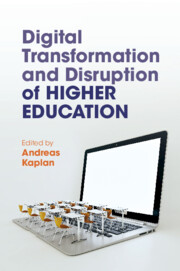Book contents
- Digital Transformation and Disruption of Higher Education
- Digital Transformation and Disruption of Higher Education
- Copyright page
- Contents
- Figures
- Tables
- Contributors
- Preface
- Chapter 1 Nothing Is Constant Except Change
- Part I (R)evolution of the Higher Education Sector
- Chapter 2 Higher Education’s Digitalisation
- Chapter 3 Online Learning
- Chapter 4 Social Exclusion and the Digital Divide
- Chapter 5 Internationalisation of Higher Education
- Chapter 6 Africa’s University Landscape
- Part II Changes in Teaching Formats
- Part III Changes in Teaching Content
- Part IV Networking and Social Activities
- Part V Certification and Diplomas
- Part VI Careers and Professionalisation
- Part VII Futuristic and Ultramodern Higher Education
- Part VIII Higher Education in Motion
- Editor’s Biography
- Index
- References
Chapter 6 - Africa’s University Landscape
Embracing Digital Transformation
from Part I - (R)evolution of the Higher Education Sector
Published online by Cambridge University Press: 09 June 2022
- Digital Transformation and Disruption of Higher Education
- Digital Transformation and Disruption of Higher Education
- Copyright page
- Contents
- Figures
- Tables
- Contributors
- Preface
- Chapter 1 Nothing Is Constant Except Change
- Part I (R)evolution of the Higher Education Sector
- Chapter 2 Higher Education’s Digitalisation
- Chapter 3 Online Learning
- Chapter 4 Social Exclusion and the Digital Divide
- Chapter 5 Internationalisation of Higher Education
- Chapter 6 Africa’s University Landscape
- Part II Changes in Teaching Formats
- Part III Changes in Teaching Content
- Part IV Networking and Social Activities
- Part V Certification and Diplomas
- Part VI Careers and Professionalisation
- Part VII Futuristic and Ultramodern Higher Education
- Part VIII Higher Education in Motion
- Editor’s Biography
- Index
- References
Summary
Higher Education Institutions (HEIs) in Africa are going through transformations like in the rest of the world. Transformations include digitalisation, and participation in Corporate Social Responsibility (CSR). The transformations have opportunities and challenges. The latter include competition, reduced public funding, the effects of ecological changes on the curricula, and adoption of Technology Enhanced Learning (TEL) enhanced by the COVID-19 pandemic. The former include the speed at which information is accessed and processed, easy connections among people, and easy and virtual teaching and learning which economises on resources. One Lecturer can teach thousands of students based in different places at the same time. This chapter analyses digitalisation in HEIs in Africa. It argues that while adoption of TEL was already underway, COVID-19 enhanced it by limiting options for teaching and learning. Thus, digitalisation in HEIs is eco-friendly, flexible, and economical.
- Type
- Chapter
- Information
- Publisher: Cambridge University PressPrint publication year: 2022
References
- 1
- Cited by



